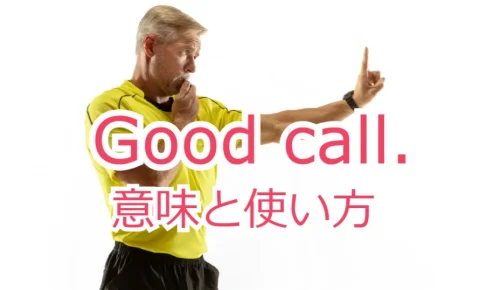こんにちは!ペタエリ英語(@peta_eri)です![/voice]
「がんばれ」「がんばって」は英語で何というでしょうか?
そう、“Good luck” ですね!
それでは、
“Good luck with school.”
“Good luck on the exam.”
この、“Good luck with~.” と “Good luck on~.” の違いや使い分けはどうでしょうか?
今日は “Good luck” の意味とその使い方、”Good luck with” と “Good luck on” の使い分けについてまとめますよ!

Good luck の意味とは?

“Good luck” は、文字通り「幸運がありますように」という意味の表現です。
たとえば新しい仕事や試験などが控えている人に対して「うまくいくといいね」という意味で使います。
日本語の「がんばれ」「がんばって」に近い使われ方をするので是非誰かを応援するときに使ってください。
good luck
used to say that you hope that someone is successful or that something good happens to them
good luck
If you say ‘Good luck’ or ‘Best of luck’ to someone, you are telling them that you hope they will be successful in something they are trying to do.
Good luck with と Good luck on の違いとその使い分けは?


“Good luck to ” は「人」に対して使うよ。(例:. Good luck to him.)
“Good luck with~” と “Good luck on~” は、「物事」に対して使うね。
強いて言えば、
“Good luck with” の方は広く一般的に使われるのに対して、
“Good luck on” の方は、「より具体的で実体としてあるものに対して使う(抽象的なものには使わない)かな。
例えば下の例文のように “test” の場合は “Good luck on” でも “Good luck with” でもどちらでも良いんだけど、 “job” や “school” のように抽象的なものに “Good luck on” は使わないよ。
Good luck with ~:広く使われる(具体的、抽象的、どちらでもOK)
Good luck on ~:具体的なものに対して使う(抽象的なものには使えない)
自然な文 : Good luck with that. / Good luck with school. / Good luck on your test tomorrow.
不自然な文 : Good luck on that. / Good luck on school.


まぁ “Good luck with” と “Good luck on” で迷ったら、 “Good luck with” を使っておけば間違いないよ。
例文で見てみてね。
発音付き例文でGood luckの意味と使い方を確認!
Good luck on your test! (on の代わりに with を使っても可)
(テストがんばってね(うまくいく様祈ってるよ))
Good luck with your new job! (この場合は on は不自然。具体的でないため)
(新しい仕事がんばってね(うまくいくといいね))
My friend Pete is running a marathon this Saturday. Do you wanna go cheer him on with me?
(今週の土曜日のマラソンに友達のピートがでるんだ。一緒に応援に行かない?)
Saturday? Sorry, I can’t make it, but tell him good luck for me.
(土曜日?ごめん、いけないや。でも「がんばって」って伝えといて)
I’m going to a tennis competition this weekend.
(今週末、テニスの大会があるんだ)
Wow. Good luck! I know you can do it.
(おお、がんばって!(うまくいくよう祈ってるよ)
Do you have any New Year’s resolutions?
(新年の抱負はある?)
Yeah, quite a few, actually. My New Year’s resolutions are to stay away from junk food, work out more and get in shape, and hopefully give up smoking.
(うん、たくさんあるよ。新年の抱負はジャンクフードを食べないようすること、もっと運動してやせること。あとできればタバコをやめることかな)
Wow! That’s a lot. Good luck!
(わお、たくさんだね!がんばって)
皮肉としての “Good luck”

他の記事でも何度か言ってるけど、英語では言葉自体より、言い方や態度がすごく大切。
日本語でもそうであるように、言い方や使う場面次第では、「(無理だと思うけど)せいぜいがんばれよ」のように皮肉(sarcasm)として伝わることもあるので注意しましょう!
I’m going to be a famous YouTuber one day.
(いつか有名なユーチューバーになるんだ)
Yeah, yeah. Good luck.
(はいはい。がんばってね)
Hey, I mean it.
(本気だってば)





































日常会話でも便利な英語表現 “Good luck” の意味・使い方とともに、発音も一緒に確認してくださいね!